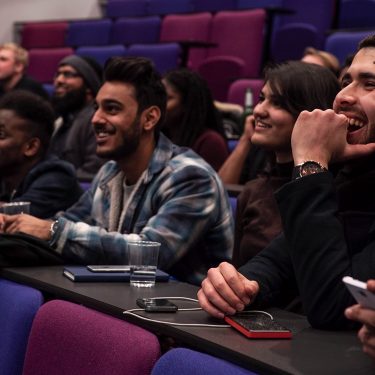Mhairi Underwood, Head of Student Voice and Diversity at The Student Room, recently gave evidence to the commission in our session on student support and wellbeing. Here she reports further on The Student Rooms’ research into how teacher assessed grades have impacted students’ academic confidence
Your results don’t define you’, we say. But if we’re honest… do they?
A few months ago I was speaking with a first year uni student from our online community at The Student Room. When we were talking about them getting into uni, they said to me ‘I’m from the cohort that received fake grades.’ They were referring to the ‘mutant algorithm’ as it’s been described; and the hasty backflip, where some students got their Centre-Assessed Grades (CAGs) and some students received grades decided by the algorithm (whichever result was higher).
Despite the fact that this student had been successfully placed on the course they wanted, they felt totally disconnected from what those grades were supposed to represent. They didn’t feel they were fair.They weren’t the result of the exams our system has taught students are so important.
I spoke to this student again ahead of writing this piece. They’ve just passed their first year of uni, but these ‘fake grades’ have continued to impact them and their peers all this time.
‘We really feel disadvantaged by it. There was a lot of stress around our uni exams linked to this idea of them being “the first real exams” or that maybe someone “didn’t deserve to be there” if they feel the A level grades they got were inflated so were more worried that the uni exams would ‘expose’ them. Equally, students I know who received poorer grades which were then U-turned or they were accepted anyway felt that they really had to prove themselves. I don’t think anyone really believes the assurances that our grades are the same as if we’d sat the exams and even if that’s true when looking at uni admissions or jobs, the students I know and myself feel that we’ve lost out on the security of knowing we deserve our grades and our places on our courses.’
When I think about the younger students currently on their journey through GCSEs and A-levels, the disruptive effects of the pandemic to their education and what that will mean for them is also huge. These results affect young people’s mental health and wellbeing, their sense of self-worth and their identity.
In April of 2020 and 2021, we conducted polls on The Student Room which received around 5000 votes each, asking students what factors were impacting their mental health most right now. Both years it was ‘uncertainty around education’ that was the biggest worry. In another poll in May this year, less than a quarter of students said they felt their grades would be fair – not necessarily because of anything to do with their teachers or schools, but because there’s no national comparison and they know their experience of assessment may have been drastically different to peers in other settings.
‘I heard some people were able to use notes in their exams. I’m among students that were told of the possible topics that were going to be in the assessments. It’s not going to be very fair as they aren’t standardised across schools.’
‘I think the results that I will be given will be a true representation of me but when being compared to other schools I think the grading is unfair as every school had got their evidence in slightly different ways.’
Without that national yardstick, students know their grades won’t tell them where they stand compared to students outside of their own school. Not having this comparison contributes to the problem of students trying to ascribe value to these results, and not being able to.
In June this year, almost 90% of students said they feel receiving Teacher-Assessed Grades (TAGs) will negatively impact their future. The results told us that the biggest worry about TAGs is that it will negatively impact students’ chances of getting into college or university. It’s also particularly telling that the second biggest worry is that their grades will be seen as ‘lesser’ because these students didn’t take traditional exams.
‘I’m extremely worried about one grade that will impact my whole university place.’
‘Now that grades have been so inflated, the all 9s I worked so so hard for (and would have gotten had I taken exams) were lowered… and now everyone else has those grades. It sucks that the strongest area of my application has been reduced in value, even if it’s still good.’
It could be assumed that if there is a continuation of altered assessments into 2022, there will be at least another two cohorts facing a similar challenge when it comes to the mental health impacts of altered results. The 2022 A-level cohort for example, were never able to experience a GCSE exam season. As they come into their A-levels assessments, some are questioning the academic preparedness of these students, but we should also consider the emotional and mental preparedness of these young people who are undertaking such a stressful task when they’ve had little opportunity to build confidence or resilience to the process.
I’m sure it’s been at least a little while since we’ve all been in post-16 or post-18 education, and it’s pretty easy for us, with the benefit hindsight and retrospect, to say ‘Yeah, but results don’t really define you in the long run.’ And that may end up being true for some. But in many students’ lives, Results is a defining moment. The words on that paper and the immediate implications of that has the potential to continue impacting the mental health and the way a student perceives themselves for years to come. We’re seeing it with first years already.
Imposter syndrome, lack of confidence, and the pressure to prove themselves are all themes we’re seeing coming through in our community and our research. Despite having ‘moved on’ from post-18 education and their results, students may be left grappling with confidence and sense of self for longer than we might currently anticipate.
I was encouraged by the thinking in Rae Tooth’s article on improving an education system which wasn’t perfect in the first place, as we recover from the pandemic. It makes me wonder whether in the future there could be room for learning more about the mental health impacts of the way we assess students and reach judgements about them, especially considering the GCSE and A-level models, and how this may go on to impact them in the future.
Maybe there’s a way to find a system which supports students’ learning and achievement in ways that promote positive mental health and wellbeing, so when they move into the next phase of their journey, their education to that point has enabled them to move toward the adult world with resilience, confidence and a holistic sense of self.
To find more information about our Student Experience evidence sessions, including transcripts and videos, please click here
This piece is part of the ongoing series of blogs and case studies that we will be publishing over the next few months. It represents the views of the author, and is part of the broad conversation the Student Futures Commission is facilitating.







